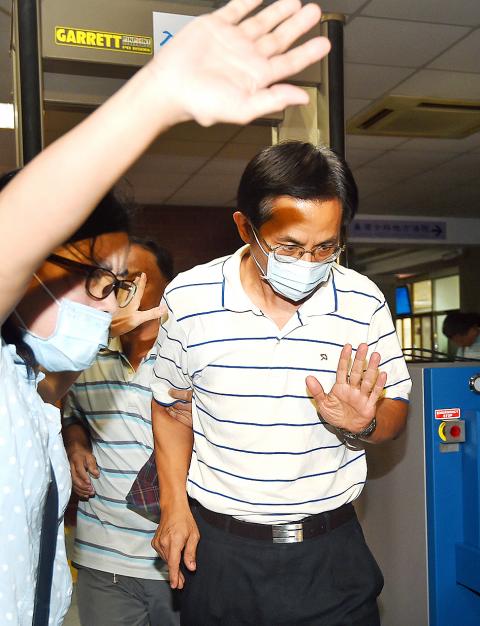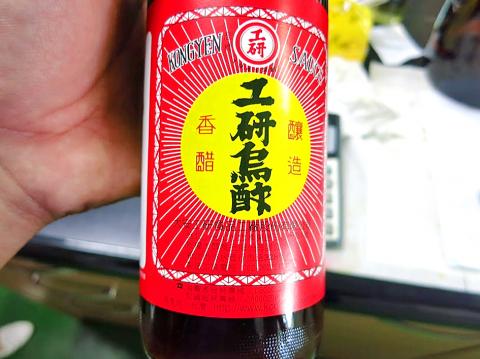Eleven vinegar and soybean paste products manufactured by Ta Chun Kong Yen Foods Co (大醇工研食品公司) were ordered to be recalled late on Thursday after the company was allegedly found to have reprocessed expired, defective and returned foodstuffs into new products.
A subsidiary and contract manufacturer of Ta An Kong Yen Foods Co (大安工研食品公司), the nation’s main vinegar manufacturer, which has been operating for 74 years, Ta Chun allegedly adulterated vinegar and soybean paste with expired and soon-to-be-expired products returned by wholesalers, the Shilin District Prosecutors’ Office said.
Prosecutors, along with Ministry of Health and Welfare inspectors, raided the company’s factory in Tamsui District (淡水), New Taipei City, and seized about 311kg of expired and unlabeled products late on Thursday night.

Photo: Liao Chen-huei, Taipei Times
Prosecutors said that they ordered the recall of nine vinegar products and two soybean paste products immediately after the raid.
Ta Chun director Hsu Chin-chun (許金春) was released on NT$5 million (US$152,858) bail after being questioned, while four other company officials were also questioned and posted bail, prosecutors said, adding that they could face fraud charges.
Prosecutors said they had conducted a secret investigation last month after they were informed by former Ta Chun employees in June of the company’s alleged illegal practices.

Photo courtesy of the New Taipei City Public Health Department
Hsu was quoted by her lawyer, Wang Kuei-shu (王桂樹), as saying that she denied any accusation of fraud, but the company “forgot” to tell consumers that its products were made with recycled and reprocessed products, for which the company was at fault.
Stressing that Ta Chun has strictly followed traditional methods when making vinegar and soybean paste, Wang said that the company reprocessed expired products between January last year and June this year, adding that “the longer the vinegar is stored, the more fragrant it is.”
Ta An director Hsu Chia-hsu (許嘉旭), the brother of Hsu Chin-chun, had no knowledge about the management of Ta Chun and the two companies operate independently, Wang said.
The Food and Drug Administration said that all foodstuffs must be labeled with an expiration date and it is illegal to use or sell any expired products and ingredients according to the Act Governing Food Safety and Sanitation (食品安全衛生管理法).
Violators are subject to a fine of between NT$60,000 and NT$200 million, as well as the suspension or withdrawal of their operating license, the administration said.
The administration said all the suspected problematic products must be removed from shelves by midnight on Sunday and violators could face a maximum fine of NT$3 million, according to the act.
In response, Ta An said yesterday that all its products had passed government inspections and examinations by a third-party facility with no reported irregularities and that prosecutors have not produced any evidence that Ta Chun’s products were problematic.
Ta An said it would nevertheless comply with the order to recall the products.
Executive Yuan Food Safety Office Director Kang Jaw-jou (康照洲) said that the case was a violation by a single manufacturer rather than a large-scale food safety issue, adding that although it is possible the reprocessed foodstuffs contain no toxic substances, such practices are untruthful and fraudulent.

SECURITY: As China is ‘reshaping’ Hong Kong’s population, Taiwan must raise the eligibility threshold for applications from Hong Kongers, Chiu Chui-cheng said When Hong Kong and Macau citizens apply for residency in Taiwan, it would be under a new category that includes a “national security observation period,” Mainland Affairs Council (MAC) Minister Chiu Chui-cheng (邱垂正) said yesterday. President William Lai (賴清德) on March 13 announced 17 strategies to counter China’s aggression toward Taiwan, including incorporating national security considerations into the review process for residency applications from Hong Kong and Macau citizens. The situation in Hong Kong is constantly changing, Chiu said to media yesterday on the sidelines of the Taipei Technology Run hosted by the Taipei Neihu Technology Park Development Association. With

A US Marine Corps regiment equipped with Naval Strike Missiles (NSM) is set to participate in the upcoming Balikatan 25 exercise in the Luzon Strait, marking the system’s first-ever deployment in the Philippines. US and Philippine officials have separately confirmed that the Navy Marine Expeditionary Ship Interdiction System (NMESIS) — the mobile launch platform for the Naval Strike Missile — would take part in the joint exercise. The missiles are being deployed to “a strategic first island chain chokepoint” in the waters between Taiwan proper and the Philippines, US-based Naval News reported. “The Luzon Strait and Bashi Channel represent a critical access

‘FORM OF PROTEST’: The German Institute Taipei said it was ‘shocked’ to see Nazi symbolism used in connection with political aims as it condemned the incident Sung Chien-liang (宋建樑), who led efforts to recall Democratic Progressive Party (DPP) Legislator Lee Kun-cheng (李坤城), was released on bail of NT$80,000 yesterday amid an outcry over a Nazi armband he wore to questioning the night before. Sung arrived at the New Taipei City District Prosecutors’ Office for questioning in a recall petition forgery case on Tuesday night wearing a red armband bearing a swastika, carrying a copy of Adolf Hitler’s Mein Kampf and giving a Nazi salute. Sung left the building at 1:15am without the armband and apparently covering the book with a coat. This is a serious international scandal and Chinese

COUNTERINTELLIGENCE TRAINING: The ministry said 87.5 percent of the apprehended Chinese agents were reported by service members they tried to lure into becoming spies Taiwanese organized crime, illegal money lenders, temples and civic groups are complicit in Beijing’s infiltration of the armed forces, the Ministry of National Defense (MND) said in a report yesterday. Retired service members who had been turned to Beijing’s cause mainly relied on those channels to infiltrate the Taiwanese military, according to the report to be submitted to lawmakers ahead of tomorrow’s hearing on Chinese espionage in the military. Chinese intelligence typically used blackmail, Internet-based communications, bribery or debts to loan sharks to leverage active service personnel to do its bidding, it said. China’s main goals are to collect intelligence, and develop a